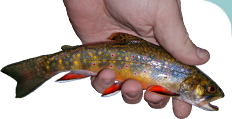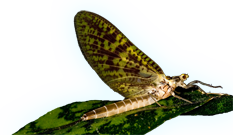Blog & Latest Updates
Fly Fishing Articles
Insects by Common Name


> > About these beautiful pictures of caddis.
The Specimen
Neophylax (Autumn Mottled Sedges) Caddisfly Adult View 20 PicturesThis large caddisfly looks really neat close-up.
View 20 PicturesThis large caddisfly looks really neat close-up.
 View 20 PicturesThis large caddisfly looks really neat close-up.
View 20 PicturesThis large caddisfly looks really neat close-up.Collected September 19, 2006 from Mystery Creek #43 in New York
Added to Troutnut.com by on October 4, 2006
Added to Troutnut.com by on October 4, 2006
The Discussion
| Vshivkova | November 18th, 2006, 4:56 pm | |
| Posts: 2 | It is not Limnephilidae, I guess it is some of Neophylax or other Thremmatinae. My reasons:a) color pattern look as in many Neophylax; at the base of hind leg spurs the only one black spine (in Limnephilidae - two sines; in Thremmatinae - 0 or one); 2) female genitalia is not as in Limnephilidae s.str. | |
| Troutnut | November 18th, 2006, 9:19 pm | |
Administrator Bellevue, WAPosts: 2737 | Thanks. I'm going to move it to Neophylax for now as you've suggested. Glad to have experts weighing in! | |
| Jason Neuswanger, Ph.D. Troutnut and salmonid ecologist | ||
| GONZO | November 19th, 2006, 10:52 am | |
Site Editor "Bear Swamp," PAPosts: 1681 | It's nice to have a more definitive opinion on this specimen. Obviously, some revisions have occurred at the family level. My latest references still list Uenoidae as the family of Neophylax. I'm curious to learn when the change to Thremmatinae happened. Does this revised family include any other important trout-stream genera? Are Eastern species like aniqua, concinnus, consimilis, fuscus, mitchelli, oliqius, and ornatus still all classified as Neophylax, or have the revisions influenced the genus level as well? The Eastern Neophylax specie(s) I'm familiar with has a ragged "torn-paper" appearance to the rear of the top wing. The only references I have for this configuration are LaFontaine's description of N. rickeri, which he lists as a Western species, and website photos of N. ornatus (which, I believe, is not the species I see most often). Any thoughts, Vshivkova? DMM? | |
| Taxon | November 19th, 2006, 2:31 pm | |
Site Editor Royse City, TXPosts: 1350 | Gonzo- All the species you mention remain Neophylax. This is most reliably verified on http://entweb.clemson.edu/database/trichopt/search.php. | |
| Best regards, Roger Rohrbeck www.FlyfishingEntomology.com | ||
| GONZO | November 19th, 2006, 3:14 pm | |
Site Editor "Bear Swamp," PAPosts: 1681 | Thanks Roger- Apparently Thremmatinae is a subfamily under Uenoidae. Now, if someone can help identify my "torn-winged" Neophylax, I'll be all straightened out! | |
| Taxon | November 19th, 2006, 3:17 pm | |
Site Editor Royse City, TXPosts: 1350 | Gonzo- Yes, that is correct. As best I can reconstruct, Neophylax was previously placed in the family Limnephilidae, subfamily Ueonoinae, but work published by Wiggins and Wisseman (in 1992) argued successfully for elevation of Ueoninae to family status. | |
| Best regards, Roger Rohrbeck www.FlyfishingEntomology.com | ||
| Litobrancha | November 20th, 2006, 11:56 am | |
| Knoxville TN Posts: 51 | good call. hadn't considered neophylax but the hind wing characters fit too. neophylax concinnus has a distinctive dorsal color pattern that could be argued to to look like torn paper. it's kinda diamond shaped. this specimen looks sorta like the Neophylax ornatus specimen in the color plates in the new neophylax keys (vineyard wiggins schefter). but you can't tell by looking at just at that. incidentally N ornatus comes out in the late spring or early summer (june-july) around here, the rest of the neophylax species are autumnal emergers (sept-october). | |
| GONZO | November 20th, 2006, 12:49 pm | |
Site Editor "Bear Swamp," PAPosts: 1681 | Thanks Lito- The info on the earlier emergence of ornatus confirms my assumption that it wasn't the species I'm used to seeing. I think that concinnus is a good possibility, though it's not recorded from many northeastern counties here in PA. It's also possible that what I recognize as a "torn-winged" Neophylax could be sister species with a similar appearance. They are fall emergers. The ones I've seen in the Poconos frequent fast, rocky little streams, while the only Neophylax I've noticed here in the Cumberland Valley came from a large valley limestoner (the Yellow Breeches). I've never inspected either very closely, so it's unlikely that I'll get any closer to identifying it/them until I capture some for comparison. No big deal--I've never encountered a fishable emergence of either. Until I do, it's just idle curiosity (from a fly-fishing perspective). | |
Quick Reply
You have to be logged in to post on the forum. It's this easy:
Related Discussions
| Title | Replies | Last Reply |
| Re: More detailed ID? In Neophylax Caddisfly Adult by Troutnut | 1 | Nov 18, 2006 by Vshivkova |
| Re: Glossosomatidae In Neophylax Caddisfly Larva by DMM | 1 | Apr 22, 2007 by DMM |
| Re: Former classification In the Caddisfly Family Uenoidae by Troutnut | 2 | Jul 24, 2006 by Troutnut |
| Re: caddis In the Identify This! Board by Dryfly | 8 | Mar 19, 2007 by DMM |
| Re: Hydropsyche In Neophylax Caddisfly Adult by Taxon | 1 | Oct 5, 2006 by GONZO |
| Re: Looks like neophylax In Neophylax Caddisfly Larva by Litobrancha | 1 | Dec 21, 2007 by Creno |
| Re: Snow Sedge In Female Psychoglypha alascensis Caddisfly Adult by Entoman | 14 | Sep 26, 2013 by Crepuscular |
| Re: Not Hydropsyche, not Phryganeidae--more reasons In Neophylax Caddisfly Adult by GONZO | 10 | Dec 21, 2007 by Creno |
| Re: Some Familiar Philippine Macroinverts In General Discussion by PaulRoberts | 13 | Jan 12, 2014 by PaulRoberts |
| Re: Neophylax larvae and pupae (9 more) In the Photography Board by Millcreek | 3 | Nov 27, 2014 by Millcreek |
Troutnut.com is copyright © 2004-2024 Jason
Neuswanger (email Jason). See my FAQ for information about use of my images.
 privacy policy
privacy policy


